Comparative Ethics: Frameworks of Ethical Leadership Analysis
VerifiedAdded on 2021/12/20
|8
|1449
|94
Essay
AI Summary
This essay provides a comparative analysis of ethical leadership frameworks, including Utilitarianism, Kant's Categorical Imperative, and Pragmatism. It examines the practical application of these frameworks, considering the 'shadow' cast by leaders and managers, and the impact of different types of power. The essay also explores biblical business ethical principles, emphasizing how they can be applied to address ethical challenges in modern business practices, particularly in the context of outsourcing. A four-lens model of worldview development is presented to illustrate how various ethical considerations can be integrated into business concepts, culture, experience, and scriptural principles. The essay concludes with a discussion on the importance of pre-formed ethical frameworks in preparing organizations for potential challenges and facilitating employee potential.
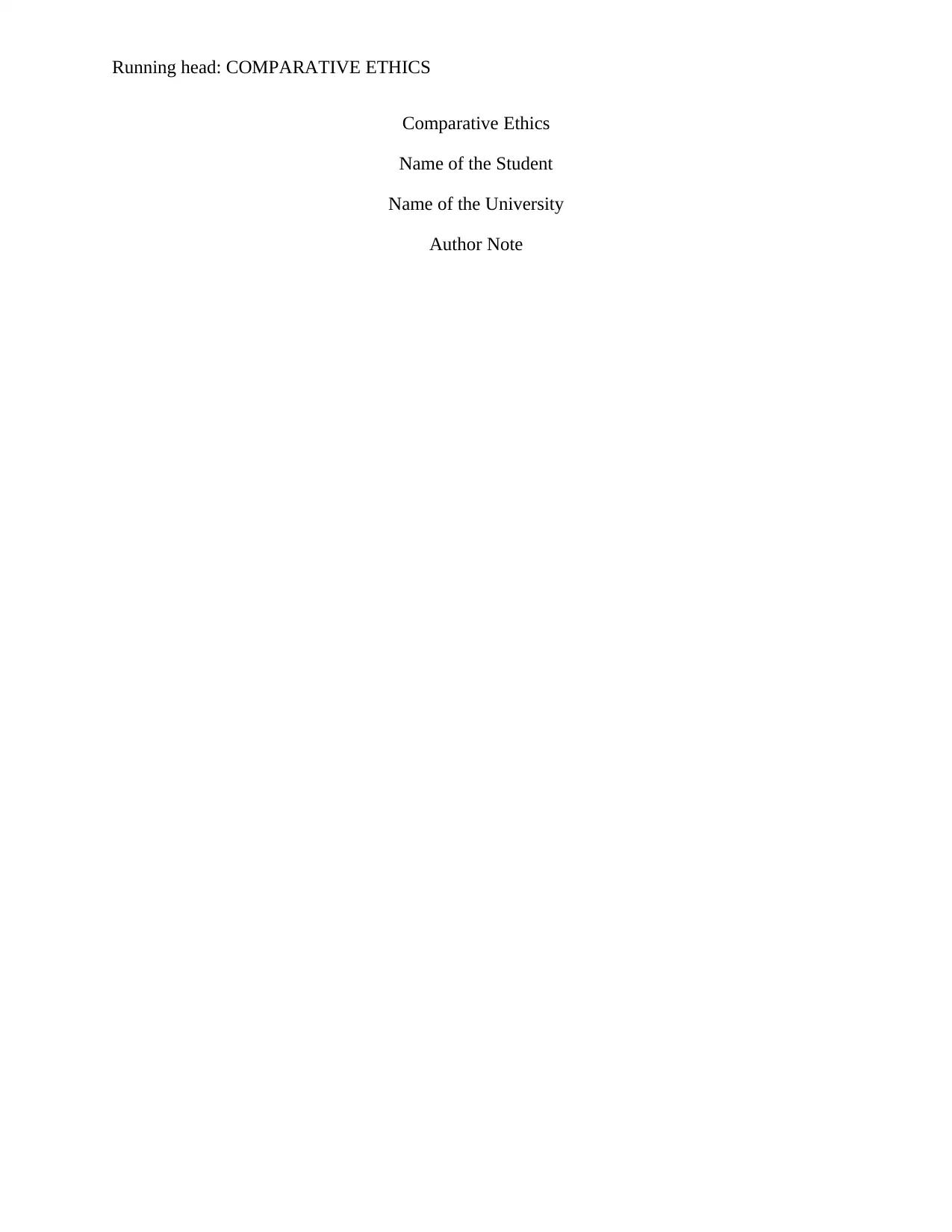
Running head: COMPARATIVE ETHICS
Comparative Ethics
Name of the Student
Name of the University
Author Note
Comparative Ethics
Name of the Student
Name of the University
Author Note
Paraphrase This Document
Need a fresh take? Get an instant paraphrase of this document with our AI Paraphraser
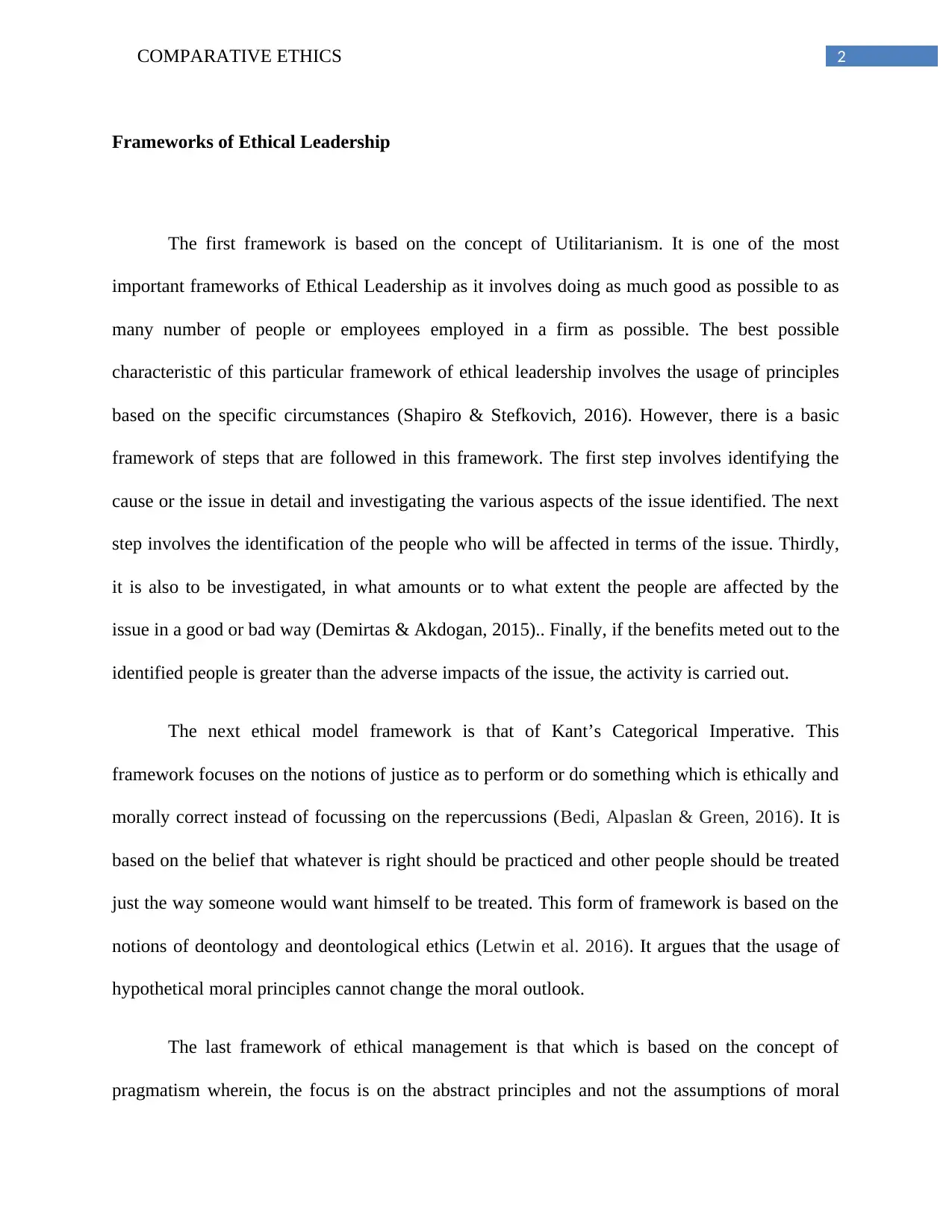
2COMPARATIVE ETHICS
Frameworks of Ethical Leadership
The first framework is based on the concept of Utilitarianism. It is one of the most
important frameworks of Ethical Leadership as it involves doing as much good as possible to as
many number of people or employees employed in a firm as possible. The best possible
characteristic of this particular framework of ethical leadership involves the usage of principles
based on the specific circumstances (Shapiro & Stefkovich, 2016). However, there is a basic
framework of steps that are followed in this framework. The first step involves identifying the
cause or the issue in detail and investigating the various aspects of the issue identified. The next
step involves the identification of the people who will be affected in terms of the issue. Thirdly,
it is also to be investigated, in what amounts or to what extent the people are affected by the
issue in a good or bad way (Demirtas & Akdogan, 2015).. Finally, if the benefits meted out to the
identified people is greater than the adverse impacts of the issue, the activity is carried out.
The next ethical model framework is that of Kant’s Categorical Imperative. This
framework focuses on the notions of justice as to perform or do something which is ethically and
morally correct instead of focussing on the repercussions (Bedi, Alpaslan & Green, 2016). It is
based on the belief that whatever is right should be practiced and other people should be treated
just the way someone would want himself to be treated. This form of framework is based on the
notions of deontology and deontological ethics (Letwin et al. 2016). It argues that the usage of
hypothetical moral principles cannot change the moral outlook.
The last framework of ethical management is that which is based on the concept of
pragmatism wherein, the focus is on the abstract principles and not the assumptions of moral
Frameworks of Ethical Leadership
The first framework is based on the concept of Utilitarianism. It is one of the most
important frameworks of Ethical Leadership as it involves doing as much good as possible to as
many number of people or employees employed in a firm as possible. The best possible
characteristic of this particular framework of ethical leadership involves the usage of principles
based on the specific circumstances (Shapiro & Stefkovich, 2016). However, there is a basic
framework of steps that are followed in this framework. The first step involves identifying the
cause or the issue in detail and investigating the various aspects of the issue identified. The next
step involves the identification of the people who will be affected in terms of the issue. Thirdly,
it is also to be investigated, in what amounts or to what extent the people are affected by the
issue in a good or bad way (Demirtas & Akdogan, 2015).. Finally, if the benefits meted out to the
identified people is greater than the adverse impacts of the issue, the activity is carried out.
The next ethical model framework is that of Kant’s Categorical Imperative. This
framework focuses on the notions of justice as to perform or do something which is ethically and
morally correct instead of focussing on the repercussions (Bedi, Alpaslan & Green, 2016). It is
based on the belief that whatever is right should be practiced and other people should be treated
just the way someone would want himself to be treated. This form of framework is based on the
notions of deontology and deontological ethics (Letwin et al. 2016). It argues that the usage of
hypothetical moral principles cannot change the moral outlook.
The last framework of ethical management is that which is based on the concept of
pragmatism wherein, the focus is on the abstract principles and not the assumptions of moral
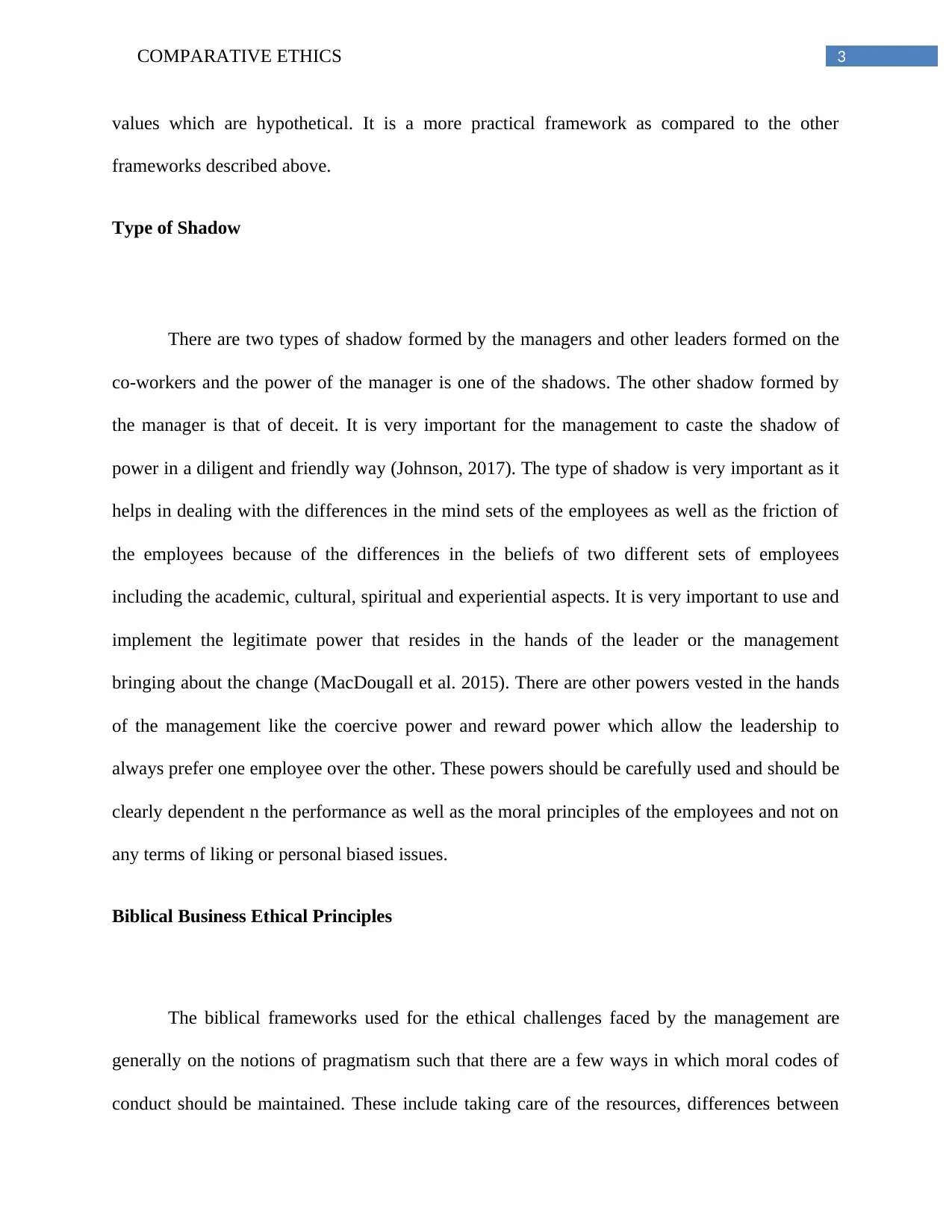
3COMPARATIVE ETHICS
values which are hypothetical. It is a more practical framework as compared to the other
frameworks described above.
Type of Shadow
There are two types of shadow formed by the managers and other leaders formed on the
co-workers and the power of the manager is one of the shadows. The other shadow formed by
the manager is that of deceit. It is very important for the management to caste the shadow of
power in a diligent and friendly way (Johnson, 2017). The type of shadow is very important as it
helps in dealing with the differences in the mind sets of the employees as well as the friction of
the employees because of the differences in the beliefs of two different sets of employees
including the academic, cultural, spiritual and experiential aspects. It is very important to use and
implement the legitimate power that resides in the hands of the leader or the management
bringing about the change (MacDougall et al. 2015). There are other powers vested in the hands
of the management like the coercive power and reward power which allow the leadership to
always prefer one employee over the other. These powers should be carefully used and should be
clearly dependent n the performance as well as the moral principles of the employees and not on
any terms of liking or personal biased issues.
Biblical Business Ethical Principles
The biblical frameworks used for the ethical challenges faced by the management are
generally on the notions of pragmatism such that there are a few ways in which moral codes of
conduct should be maintained. These include taking care of the resources, differences between
values which are hypothetical. It is a more practical framework as compared to the other
frameworks described above.
Type of Shadow
There are two types of shadow formed by the managers and other leaders formed on the
co-workers and the power of the manager is one of the shadows. The other shadow formed by
the manager is that of deceit. It is very important for the management to caste the shadow of
power in a diligent and friendly way (Johnson, 2017). The type of shadow is very important as it
helps in dealing with the differences in the mind sets of the employees as well as the friction of
the employees because of the differences in the beliefs of two different sets of employees
including the academic, cultural, spiritual and experiential aspects. It is very important to use and
implement the legitimate power that resides in the hands of the leader or the management
bringing about the change (MacDougall et al. 2015). There are other powers vested in the hands
of the management like the coercive power and reward power which allow the leadership to
always prefer one employee over the other. These powers should be carefully used and should be
clearly dependent n the performance as well as the moral principles of the employees and not on
any terms of liking or personal biased issues.
Biblical Business Ethical Principles
The biblical frameworks used for the ethical challenges faced by the management are
generally on the notions of pragmatism such that there are a few ways in which moral codes of
conduct should be maintained. These include taking care of the resources, differences between
⊘ This is a preview!⊘
Do you want full access?
Subscribe today to unlock all pages.

Trusted by 1+ million students worldwide
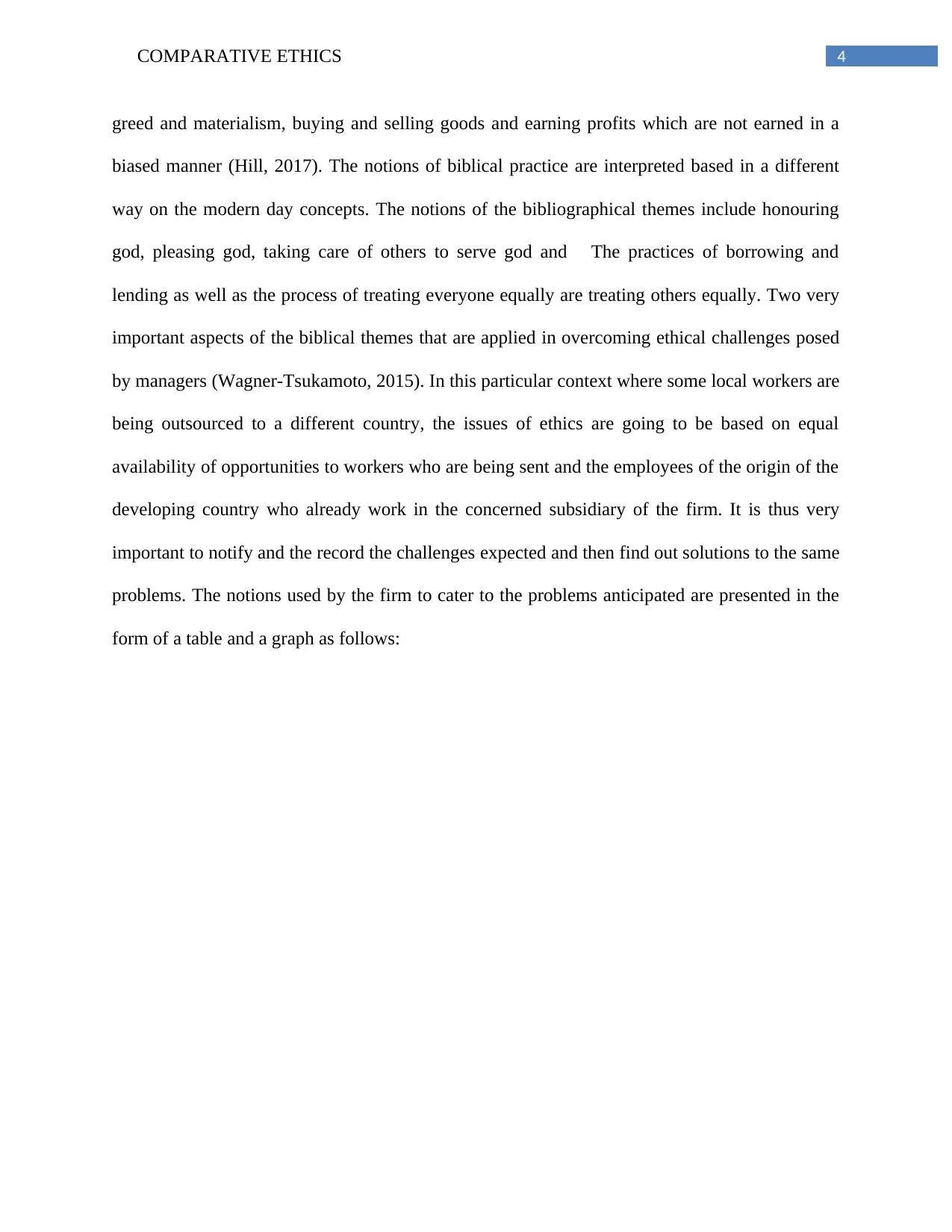
4COMPARATIVE ETHICS
greed and materialism, buying and selling goods and earning profits which are not earned in a
biased manner (Hill, 2017). The notions of biblical practice are interpreted based in a different
way on the modern day concepts. The notions of the bibliographical themes include honouring
god, pleasing god, taking care of others to serve god and The practices of borrowing and
lending as well as the process of treating everyone equally are treating others equally. Two very
important aspects of the biblical themes that are applied in overcoming ethical challenges posed
by managers (Wagner-Tsukamoto, 2015). In this particular context where some local workers are
being outsourced to a different country, the issues of ethics are going to be based on equal
availability of opportunities to workers who are being sent and the employees of the origin of the
developing country who already work in the concerned subsidiary of the firm. It is thus very
important to notify and the record the challenges expected and then find out solutions to the same
problems. The notions used by the firm to cater to the problems anticipated are presented in the
form of a table and a graph as follows:
greed and materialism, buying and selling goods and earning profits which are not earned in a
biased manner (Hill, 2017). The notions of biblical practice are interpreted based in a different
way on the modern day concepts. The notions of the bibliographical themes include honouring
god, pleasing god, taking care of others to serve god and The practices of borrowing and
lending as well as the process of treating everyone equally are treating others equally. Two very
important aspects of the biblical themes that are applied in overcoming ethical challenges posed
by managers (Wagner-Tsukamoto, 2015). In this particular context where some local workers are
being outsourced to a different country, the issues of ethics are going to be based on equal
availability of opportunities to workers who are being sent and the employees of the origin of the
developing country who already work in the concerned subsidiary of the firm. It is thus very
important to notify and the record the challenges expected and then find out solutions to the same
problems. The notions used by the firm to cater to the problems anticipated are presented in the
form of a table and a graph as follows:
Paraphrase This Document
Need a fresh take? Get an instant paraphrase of this document with our AI Paraphraser
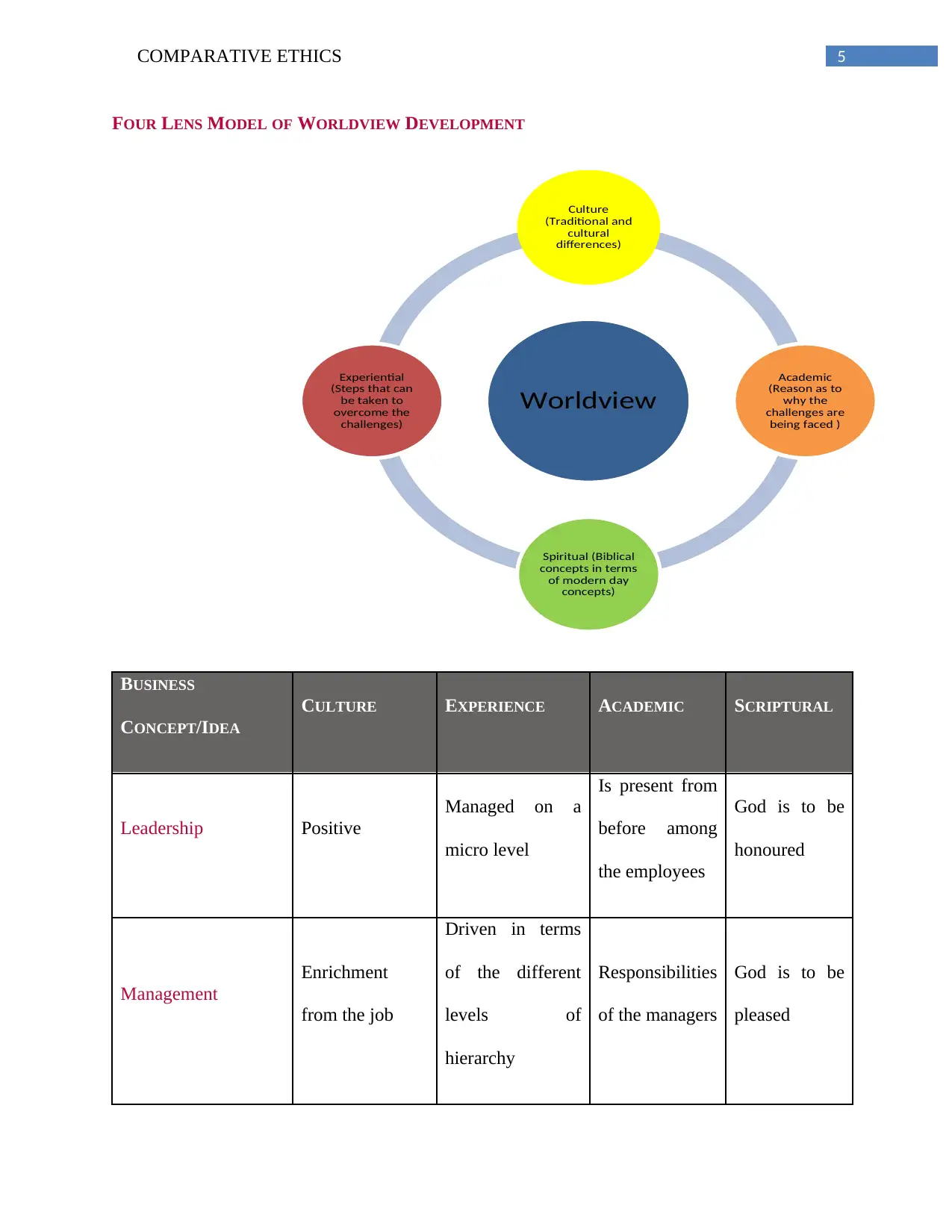
5COMPARATIVE ETHICS
FOUR LENS MODEL OF WORLDVIEW DEVELOPMENT
BUSINESS
CONCEPT/IDEA
CULTURE EXPERIENCE ACADEMIC SCRIPTURAL
Leadership Positive
Managed on a
micro level
Is present from
before among
the employees
God is to be
honoured
Management
Enrichment
from the job
Driven in terms
of the different
levels of
hierarchy
Responsibilities
of the managers
God is to be
pleased
Worldview
Culture
(Traditional and
cultural
differences)
Academic
(Reason as to
why the
challenges are
being faced )
Spiritual (Biblical
concepts in terms
of modern day
concepts)
Experiential
(Steps that can
be taken to
overcome the
challenges)
FOUR LENS MODEL OF WORLDVIEW DEVELOPMENT
BUSINESS
CONCEPT/IDEA
CULTURE EXPERIENCE ACADEMIC SCRIPTURAL
Leadership Positive
Managed on a
micro level
Is present from
before among
the employees
God is to be
honoured
Management
Enrichment
from the job
Driven in terms
of the different
levels of
hierarchy
Responsibilities
of the managers
God is to be
pleased
Worldview
Culture
(Traditional and
cultural
differences)
Academic
(Reason as to
why the
challenges are
being faced )
Spiritual (Biblical
concepts in terms
of modern day
concepts)
Experiential
(Steps that can
be taken to
overcome the
challenges)
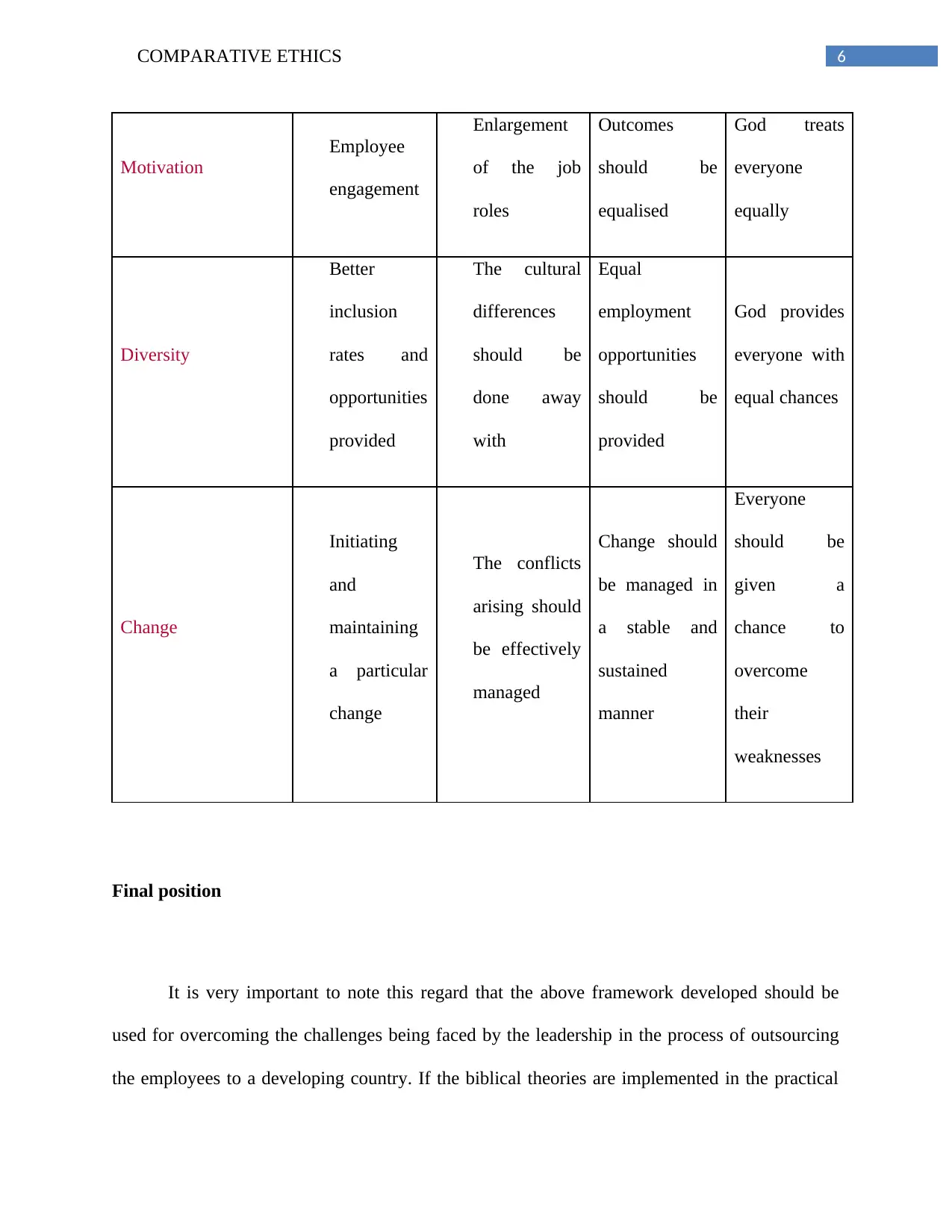
6COMPARATIVE ETHICS
Motivation
Employee
engagement
Enlargement
of the job
roles
Outcomes
should be
equalised
God treats
everyone
equally
Diversity
Better
inclusion
rates and
opportunities
provided
The cultural
differences
should be
done away
with
Equal
employment
opportunities
should be
provided
God provides
everyone with
equal chances
Change
Initiating
and
maintaining
a particular
change
The conflicts
arising should
be effectively
managed
Change should
be managed in
a stable and
sustained
manner
Everyone
should be
given a
chance to
overcome
their
weaknesses
Final position
It is very important to note this regard that the above framework developed should be
used for overcoming the challenges being faced by the leadership in the process of outsourcing
the employees to a developing country. If the biblical theories are implemented in the practical
Motivation
Employee
engagement
Enlargement
of the job
roles
Outcomes
should be
equalised
God treats
everyone
equally
Diversity
Better
inclusion
rates and
opportunities
provided
The cultural
differences
should be
done away
with
Equal
employment
opportunities
should be
provided
God provides
everyone with
equal chances
Change
Initiating
and
maintaining
a particular
change
The conflicts
arising should
be effectively
managed
Change should
be managed in
a stable and
sustained
manner
Everyone
should be
given a
chance to
overcome
their
weaknesses
Final position
It is very important to note this regard that the above framework developed should be
used for overcoming the challenges being faced by the leadership in the process of outsourcing
the employees to a developing country. If the biblical theories are implemented in the practical
⊘ This is a preview!⊘
Do you want full access?
Subscribe today to unlock all pages.

Trusted by 1+ million students worldwide
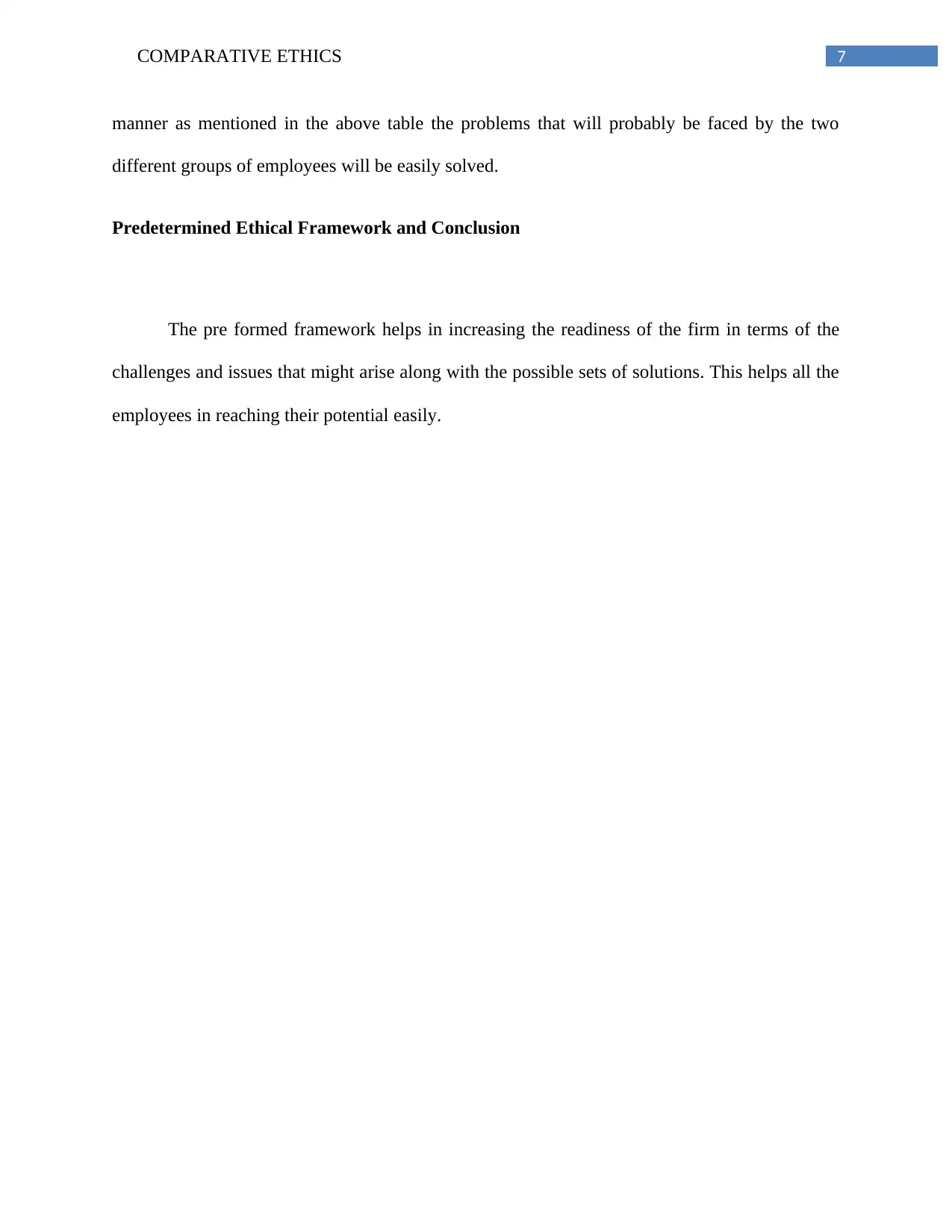
7COMPARATIVE ETHICS
manner as mentioned in the above table the problems that will probably be faced by the two
different groups of employees will be easily solved.
Predetermined Ethical Framework and Conclusion
The pre formed framework helps in increasing the readiness of the firm in terms of the
challenges and issues that might arise along with the possible sets of solutions. This helps all the
employees in reaching their potential easily.
manner as mentioned in the above table the problems that will probably be faced by the two
different groups of employees will be easily solved.
Predetermined Ethical Framework and Conclusion
The pre formed framework helps in increasing the readiness of the firm in terms of the
challenges and issues that might arise along with the possible sets of solutions. This helps all the
employees in reaching their potential easily.
Paraphrase This Document
Need a fresh take? Get an instant paraphrase of this document with our AI Paraphraser
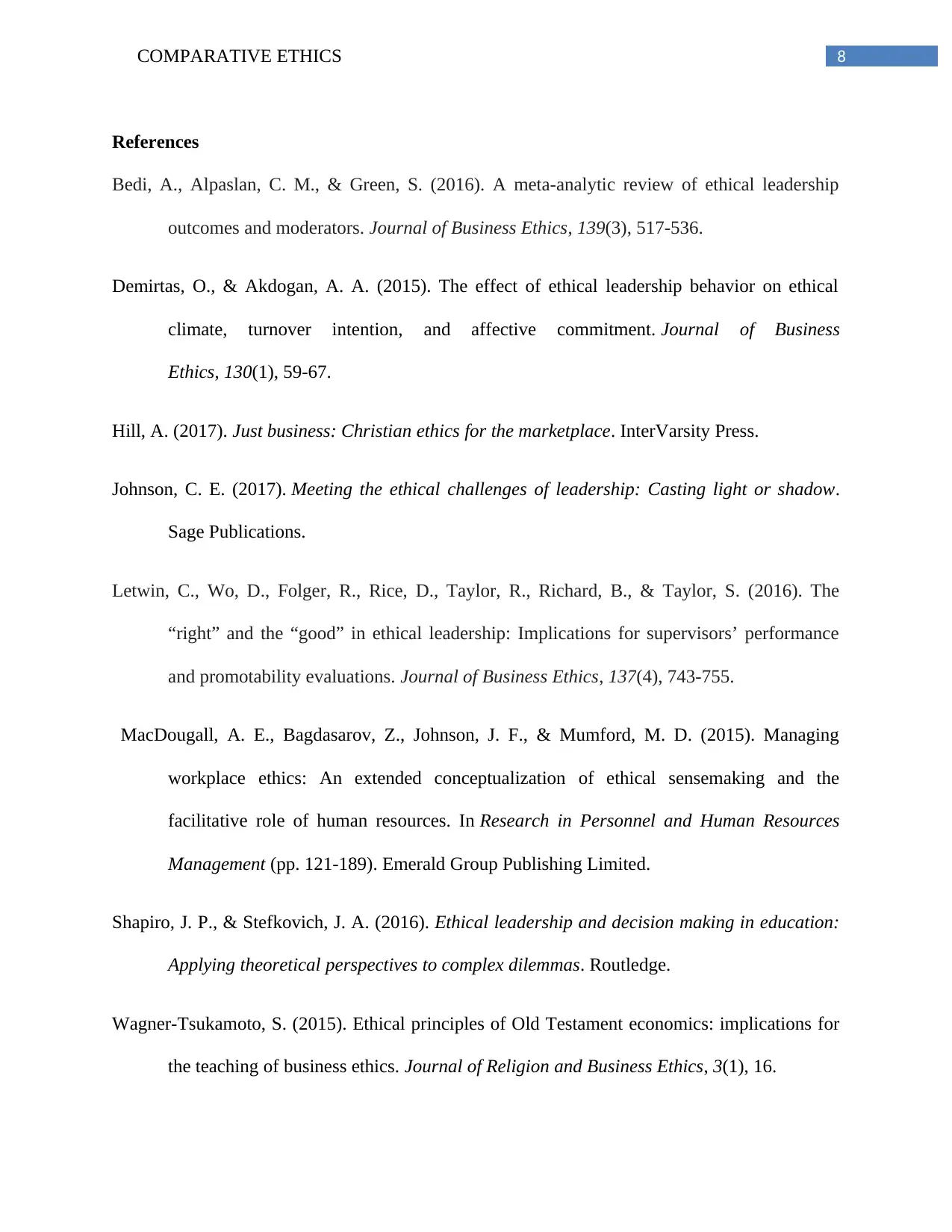
8COMPARATIVE ETHICS
References
Bedi, A., Alpaslan, C. M., & Green, S. (2016). A meta-analytic review of ethical leadership
outcomes and moderators. Journal of Business Ethics, 139(3), 517-536.
Demirtas, O., & Akdogan, A. A. (2015). The effect of ethical leadership behavior on ethical
climate, turnover intention, and affective commitment. Journal of Business
Ethics, 130(1), 59-67.
Hill, A. (2017). Just business: Christian ethics for the marketplace. InterVarsity Press.
Johnson, C. E. (2017). Meeting the ethical challenges of leadership: Casting light or shadow.
Sage Publications.
Letwin, C., Wo, D., Folger, R., Rice, D., Taylor, R., Richard, B., & Taylor, S. (2016). The
“right” and the “good” in ethical leadership: Implications for supervisors’ performance
and promotability evaluations. Journal of Business Ethics, 137(4), 743-755.
MacDougall, A. E., Bagdasarov, Z., Johnson, J. F., & Mumford, M. D. (2015). Managing
workplace ethics: An extended conceptualization of ethical sensemaking and the
facilitative role of human resources. In Research in Personnel and Human Resources
Management (pp. 121-189). Emerald Group Publishing Limited.
Shapiro, J. P., & Stefkovich, J. A. (2016). Ethical leadership and decision making in education:
Applying theoretical perspectives to complex dilemmas. Routledge.
Wagner-Tsukamoto, S. (2015). Ethical principles of Old Testament economics: implications for
the teaching of business ethics. Journal of Religion and Business Ethics, 3(1), 16.
References
Bedi, A., Alpaslan, C. M., & Green, S. (2016). A meta-analytic review of ethical leadership
outcomes and moderators. Journal of Business Ethics, 139(3), 517-536.
Demirtas, O., & Akdogan, A. A. (2015). The effect of ethical leadership behavior on ethical
climate, turnover intention, and affective commitment. Journal of Business
Ethics, 130(1), 59-67.
Hill, A. (2017). Just business: Christian ethics for the marketplace. InterVarsity Press.
Johnson, C. E. (2017). Meeting the ethical challenges of leadership: Casting light or shadow.
Sage Publications.
Letwin, C., Wo, D., Folger, R., Rice, D., Taylor, R., Richard, B., & Taylor, S. (2016). The
“right” and the “good” in ethical leadership: Implications for supervisors’ performance
and promotability evaluations. Journal of Business Ethics, 137(4), 743-755.
MacDougall, A. E., Bagdasarov, Z., Johnson, J. F., & Mumford, M. D. (2015). Managing
workplace ethics: An extended conceptualization of ethical sensemaking and the
facilitative role of human resources. In Research in Personnel and Human Resources
Management (pp. 121-189). Emerald Group Publishing Limited.
Shapiro, J. P., & Stefkovich, J. A. (2016). Ethical leadership and decision making in education:
Applying theoretical perspectives to complex dilemmas. Routledge.
Wagner-Tsukamoto, S. (2015). Ethical principles of Old Testament economics: implications for
the teaching of business ethics. Journal of Religion and Business Ethics, 3(1), 16.
1 out of 8
Related Documents
Your All-in-One AI-Powered Toolkit for Academic Success.
+13062052269
info@desklib.com
Available 24*7 on WhatsApp / Email
![[object Object]](/_next/static/media/star-bottom.7253800d.svg)
Unlock your academic potential
Copyright © 2020–2026 A2Z Services. All Rights Reserved. Developed and managed by ZUCOL.





